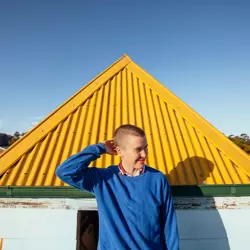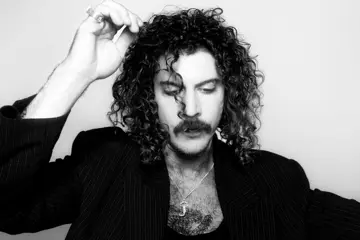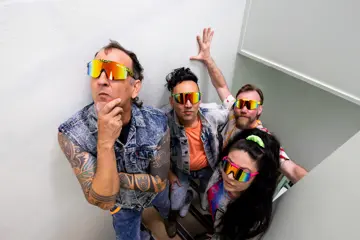 Alex The Astronaut
Alex The AstronautHow to Grow a Sunflower Underwater is Alex the Astronaut’s new album and post-lockdown escape. With a familiar love of careful lyric and a straight up melody, the songs are direct and emotive – like a splash of water after a blurry night. A watery theme (or feeling at least) came from the album’s muse – a regular snorkeling trip at Clovelly in Sydney’s South East. “I was meant to be going to the US to go on my first tour, and then the pandemic started. And yeah, it was home for the first time in a while and I didn't know what to do with my days,” Alex says. “So I'd go for a swim. And then one day, I saw people snorkeling there, and I was like,’ Oh, well, maybe I should just go and buy a snorkel’ … I ended up going like three or four times a week, I would drive across and have a little swim and then go back and I just I ended up writing at that time. And that's what the songs ended up having a lot [of that feeling] in them.”
Fans of debut The Theory of Absolutely Nothing will feel at home with the folk/pop that the new album offers, but keep digging to find some real gems. Opener “Growing up” and closer closer “Haircut”, for example, are complex as well as catchy as. The simple refrain ‘Since I cut my hair I feel so much better’ captures a really embodied feeling – something both external and internal – as well as capturing some of the artists’ own awakenings during this time. “ I cut my hair for charity for my friend who was nurse in New York. And so I was like, ‘I'll try and raise some money’. And I secretly had always wanted to, when I was eight, I wanted to get a short haircut … And then I cut my hair and I was like, ‘Oh, maybe I do have some gender stuff that I didn't know about.’ And then yeah, I guess after that, it kicked off a whole little other self-discovery thing, [just when] I thought I had enough going on.”
The other thing ‘going on’ (apart from a pandemic) has been a recent autism diagnosis. Alex has been on the record about it, and while it is ‘on the record’ here too in a way, there is more than one thing drawing the muse here. “[In the past] I've written songs that have been from other people's perspectives. Whereas this album, it was kind of a lot of stuff that happened. So I was like, ‘Okay, I think I need to kind of look at my own life, my own stories and think there's enough there to talk about’. So yeah, I guess when I was putting it together, I was kind of working out why I wanted to talk about these things. And one of the reasons was for How To Grow Sunflower on the Water is kind of wanting to show what happens to people in their lives, everything happens at the same time. Everything does overlap. Nothing's perfectly isolated as one event with nothing around it. You can lose your job and then have a breakup at the same time. You can, you know, have these big, big, big things happen.”
A superpower Alex poses is the ability to write happy songs. In addition to her previous work (note last album’s “Happy Song”), this album’s approach is to capture a range of experiences, with the positive sometimes being the one others leave out. “I usually write songs about things that have a complex emotional aspect to them. And then the game that I play, I guess, is to try and simplify it,” Alex says. “And you kind of look at that thing and think ‘okay, why is this thing emotional? Why is this relationship difficult? What is it here? And how do you represent that? And how do I talk about it? Get out of my emotions? And then how did I get people to understand it as well?’ And so it's a balancing act between, I guess, wanting everything to be bright and sunny and stuff, but also wanting to have the real emotions in there. But also, yeah, kind of making it listenable? Because if you just, it's not a real story, if you don't have kind of different colours to it. Otherwise, it's just like, ‘I’m sad’”.
Don't miss a beat with our FREE daily newsletter
By way of example Alex points to opener “Growing Up” again, to capture the personal as well as the universal. “I feel like the hopefulness in that one is the solidarity. You know, we all go through that process. And everyone has been in, there's lots of people that have come before us that have grown up and they know when to check their parking fine, and how to get insurance and stuff like that. We have that connection. That's the hopefulness. The hard stuff is still all there. It's still real, and it's still going to keep happening. You can't stop that. But you do have that solidarity.”
How to Grow A Sunflower Underwater on July 22 through Warner. You can catch her at this weekend's Splendour in the Grass















